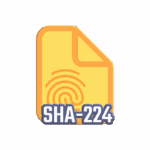Need to generate RIPEMD-160 hashes quickly? Our RIPEMD-160 hash generator lets you create them by typing text or selecting files. It’s a straightforward way to check information accuracy or confirm files haven’t been altered.

RIPEMD-160 is a cryptographic hash function designed for data integrity verification and secure hashing. To help you learn more about SHA-512, we will explain the basic terms, provide examples, and answer common questions to enhance your understanding.
Definitions
What is RIPEMD-160?
RIPEMD-160 (RACE Integrity Primitives Evaluation Message Digest 160-bit) is a cryptographic hash function created in 1996 by the RIPE (RACE Integrity Primitives Evaluation) project to enhance the original RIPEMD algorithm[1]. It generates a compact 160-bit or 40 hexadecimal characters hash, shorter than SHA-2 or SHA-3 variants but still effective for verifying data integrity and securing digital processes.
RIPEMD-160 is designed to ensure collision resistance and reliability and is commonly used in blockchain systems, notably Bitcoin, for wallet addresses, digital signatures, and checksum validation. While secure for general purposes, its adoption lags behind SHA-2 and SHA-3 due to its smaller hash size and reduced computational complexity, which prioritizes efficiency over cutting-edge security.
Key Features

Here are the key features of the RIPEMD-160 cryptographic hash function.
- Secure hashing: Designed for checksums, digital signatures, and blockchain hashing to verify data authenticity.
- 160-bit hash output: Generates a compact 160-bit digest, balancing collision resistance with smaller size compared to SHA-256/SHA-512.
- Strong collision resistance: Improved over original RIPEMD to better prevent attacks where two inputs produce the same hash.
- Lightweight efficiency: Less computationally demanding than SHA-2, ideal for low-resource environments.
- Cryptographic versatility: Used in blockchain (e.g., Bitcoin addresses), PGP encryption, and digital signatures.
- SHA alternative: Trusted in legacy systems needing lightweight hashing despite SHA-2/SHA-3 dominance.
- Double compression function: Uses two parallel processing streams for stronger data mixing and integrity checks.

Examples
Here’s a table of text samples along with their corresponding RIPEMD-160 hash values:
| Text Input | SHA-512 Hash Output |
|---|---|
Apple | 0bd1e420f68c278358b45724485c5bb518597cf8 |
Banana | aefc6fe080425a291f81ea3d7c10719c59980e89 |
Blackberry | 93b1cdf8e6367e48a7d5be9836c58f377971a3d6 |
Cherry | 0a9f05aa881e58b6dcecdb0629db87d85e4588c2 |
password | 2c08e8f5884750a7b99f6f2f342fc638db25ff31 |
The quick brown fox jumps over the lazy dog | 37f332f68db77bd9d7edd4969571ad671cf9dd3b |
FAQs
1. Can RIPEMD-160 be reversed or decrypted?
No, RIPEMD-160 is a one-way hash function, like all hashes, it’s a one-way street, you turn data into a scrambled code, but there’s no undo button.
2. Is RIPEMD-15 secure?
For basic jobs like checksums or Bitcoin addresses, yes. But its shorter hash means it’s easier to brute-force than SHA-256. While not broken, experts suggest SHA-2 or SHA-3 for new projects needing future-proof security.
3. What are practical use cases for RIPEMD-160?
RIPEMD-160 is commonly used in blockchain hashing (Bitcoin addresses), digital signatures, checksum verification, and cryptographic applications that require lightweight hashing.
4. How does it stack up against MD5?
RIPEMD-160 is way tougher than MD5 (which hackers can break). But SHA-2 is still the gold standard, like choosing a bike lock (RIPEMD-160) over a vault door (SHA-256).








